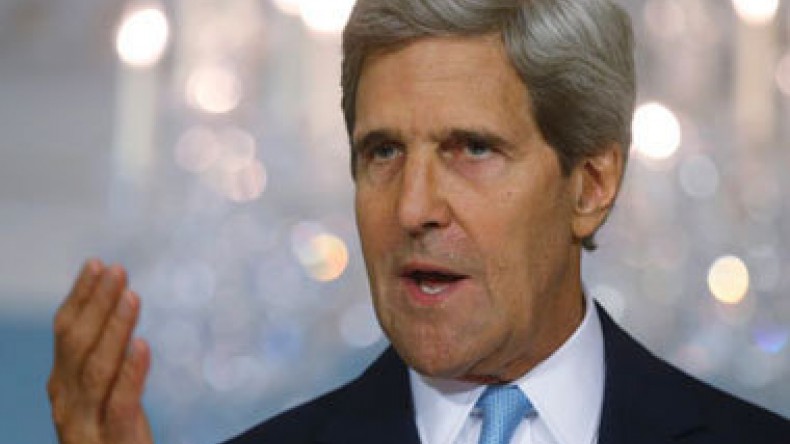
Human rights groups appeal to U.S. Secretary of State to boycott European games in Baku
45 representatives of international human rights organizations, politicians and experts from various countries, representatives of the Azerbaijani diaspora sent an open letter to the U.S. Secretary of State John Kerry, urging him to boycott the European games in Baku and impose sanctions against Azerbaijani officials, international human rights organization Freedom House reports.
As the letter has it, considering the deteriorating human rights situation in Azerbaijan, the Western governments should impose a visa ban on Azerbaijani officials involved in large-scale human rights abuses; block trade promotion assistance to Azerbaijani state-owned entities; convene parliamentary hearings on the situation in Azerbaijan; organize a political leaders’ boycott of the European games in Baku. The letter also urges corporate partners of to withdraw the sponsorship of the European Games.
For years, Azerbaijan’s importance as an energy supplier and partner on security and counter-terrorism has outweighed attention to its deplorable human rights record. Today, such an approach is especially untenable. With parliamentary elections scheduled for later in 2015, the situation will only get worse unless the West takes decisive action, the letter says.
''We, undersigned, are alarmed by the deteriorating human rights situation in Azerbaijan. Arrests and detentions of journalists, civil society and human rights activists, religious believers, and opposition figures have multiplied,'' the letter reads.
It is noted that the government of Azerbaijan has targeted domestic and foreign NGOs freezing their bank accounts and paralyzing their activities. Corruption is a huge problem and inhibits the country’s ability to flourish economically and politically directly challenging the principles of freedom of speech. Senior government officials have engaged in an ugly anti-Western campaign. These actions raise serious concerns about the future of U.S.-Azerbaijani relations and doubts about the government of Azerbaijan’s commitment to comply with its international obligations before the OSCE, Council of Europe and others.
“Official expressions of concern about the deteriorating human rights situation have not yielded results. Accordingly, more concrete measures including targeted sanctions against specific government officials should be adopted to reverse this trend,” the letter reads.
It is reported that human rights organizations, governments and international organizations have already called for the immediate and unconditional release of political prisoners, but such calls have not been heeded by the government of Azerbaijan which does not accept any criticism in its address.
In a resolution passed September 18, 2014, the European Parliament called on Azerbaijan to release all political prisoners and noted a number of measures that could be used if Azerbaijan fails to do so, including consideration of the “possibility of targeted sanctions against those responsible for human rights violations.” In addition, a December 2014 report of the Venice Commission of the Council of Europe reiterated numerous prior findings and reports from the Commission and the European Court of Human Rights that Azerbaijan’s NGO legislation unduly restricts freedom of association and has a “chilling effect on civil society.”
The appeal noted that last year the representative of the Council of Europe on human rights Nils Muiznieks called the human rights situation in Azerbaijan "totally unacceptable." International human rights organization Human Rights Watch, in its annual report, says the Azerbaijani government "escalated repression" against its critics last year, "marking a dramatic deterioration in its already poor rights record." Freedom House, in its annual report, noted yearly “declines in political rights and civil liberties” in Azerbaijan, as the government “stepped up its jailing of human rights activists, journalists, and other perceived enemies.”
It is also added that religious freedom in Azerbaijan is under threat, with a marked increase in the number of arrests and repression of civil society activists and religious communities. The government has adopted a law that includes compulsory state registration with complex requirements. This law limits religious activities; establishes an extensive state control over the content, production, import, export and distribution of religious materials; religious education is also under censorship. Those found in violation of this law face fines.
It is highlighted that the United States should urge the government of Azerbaijan to undertake the following steps:
• Release all political prisoners
• Cease harassment and intimidation of family members of opposition activists, human rights defenders, and their lawyers
• Respect the rights of journalists to do their job unhindered.
• End the campaign against domestic and foreign non-governmental organizations and stop the push for legislation that would restrict the activities and funding of NGOs
• Create the conditions for free and fair parliamentary elections
• Permit foreign broadcasters to resume operations without fear of state harassment and raids
Settling this and other problems in Azerbaijan, including Nagorno Karabakh conflict, will not be possible as long as Azerbaijan continues down the authoritarian path it is currently on, as the letter has it.
Related:
Appeals in Washington to impose sanctions on Azerbaijani authorities for crackdowns on civil society
Obama is asked to save lives of human rights defenders jailed in Azerbaijan
Council of Europe Commissioner for Human Rights speaks up for Talish newspaper editor-in-chief imprisoned in Azerbaijan
Newsfeed
Videos






























